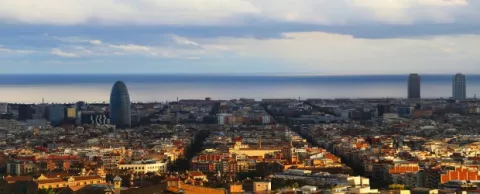
Just as a CEO is essential to managing a company, cities are creating a role just as crucial for smart city projects—a Chief Technology Officer. New York City kicked off this trend in 2014, but London quickly followed in its footsteps. Now with these CTO’s helping pave the way for smart solution strategies, cities across Europe are incorporating one major element into the mix: free Wi-Fi. Making Wi-Fi accessible and available is the crutch of smart city infrastructure not only for economic growth but also for data collection and daily services for citizens. Here's why this investment is making European capitals more efficient.— Philippe Leonard (Spanish version of the article)
Barcelona’s smart strategy
Known as the tech hub of Spain—as well as a global leader in the use of IoT—Barcelona has saved millions thanks to smart city investments like free Wi-Fi, which has helped connect the city and its citizens. In 2011, the city council launched the Barcelona WiFi programme, installing antennas throughout the city to make Wi-Fi freely accessible everywhere from the airport to restaurants and shopping centres. Now Barcelona is home to one of Europe’s largest free Wi-Fi networks, with nearly 2,000 hotspots in civic buildings, buses, public parks and even on the beach. Thanks to this service, the city and its citizens can benefit from services like IoT trash cans reporting their status in real time, as well as Smart Mobility parking and bike sharing apps. With this network boosting IoT systems throughout the city, Barcelona has transformed its economy since Spain’s 2008 recession, saving €33 million annually in smart lighting and €52 million in water.
Here are a few other takeaways from city-wide free Wi-Fi programmes:
-Increased Mobility: Open data collection can lead to digital services such as mobile GPS apps that help citizens navigate the city more efficiently. In Helsinki, for example, BlindSquare assists visually impaired users find points of interest and street intersections.
-Bridging the Socioeconomic Gap: By making Wi-Fi accessible to the public, citizens of all economic backgrounds are given the means to communicate, job hunt or access educational resources online. This not only advances the community technologically, it also adds to citizens’ productivity.
-Improved City Operations: With systems that create a “network of networks,” such as Barcelona’s integrated sensor network, data can be shared both by city workers and citizens, with requests quickly heard, received and implemented by city agencies to improve city operations.
By making the initial investment to install a free Wi-Fi programme, cities will reap long-term benefits such as these, while driving smart city projects in everything from government infrastructure to local start-ups.



